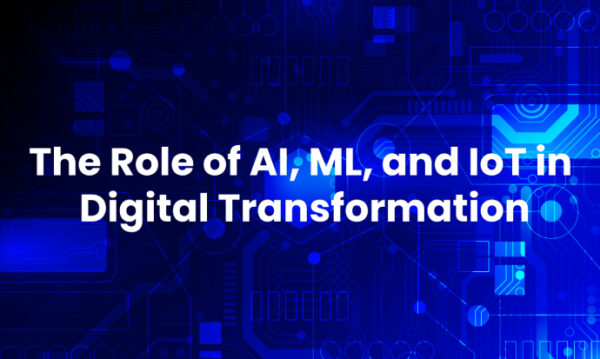A lot of noise and misunderstanding exists in the user marketplace about what digital transformation is, and the roles that artificial intelligence (AI), machine learning (ML) and the Internet of Things (IoT) play in implementing it.
Copyright by www.business2community.com
 Digital transformation is of major importance to businesses and organizations. Alphabet, a driving force in the digital marketplace, reported record profits in the second fiscal quarter of 2021 based on very strong digital ad sales, internet searches, and the growth of cloud services. Many companies have recognized the importance of digital transformation as a key strategy to gain a competitive edge in the marketplace.
Digital transformation is of major importance to businesses and organizations. Alphabet, a driving force in the digital marketplace, reported record profits in the second fiscal quarter of 2021 based on very strong digital ad sales, internet searches, and the growth of cloud services. Many companies have recognized the importance of digital transformation as a key strategy to gain a competitive edge in the marketplace.
Digital Transformation
Digital transformation is a process that has been ongoing for decades whether businesses have focused on it as a paradigm shift in the way business is conducted or not. Email, ERP platforms, cloud computing, digital advertising, online retailing, telehealth, working remote and video streaming are a few examples of businesses and processes that have undergone digital transformation. All these changes were made possible by transformation to digital processes.
Businesses and organizations have begun to realize that digital transformation can be planned and implemented proactively to be more competitive, enhance customer experiences, and improve processes that are customer touch points. AI and ML tools and the IoT channel are readily available for the planning and implementation of a proactive digital transformation strategy.
Role of AI and ML
AI and ML are tools that can be used to plan and implement a digital transformation that focuses on what is needed to gain a competitive edge with customers now and in the future. They help companies develop comprehensive strategies for data transformation based on real-time market intelligence rather than piece-meal tactics of disjointed updating of systems and processes.
ML uses big data to analyze and correlate patterns which can offer insights into customer behavior and other events. It provides insights on solutions to improve business processes and customer experiences. Instead of finding out about a change in customer behavior after sales have already declined, ML can help to identify shifts in behavior and events as they happen so solutions can be devised to head off a decline in sales. […]
Read more: www.business2community.com


A lot of noise and misunderstanding exists in the user marketplace about what digital transformation is, and the roles that artificial intelligence (AI), machine learning (ML) and the Internet of Things (IoT) play in implementing it.
Copyright by www.business2community.com
Digital Transformation
Digital transformation is a process that has been ongoing for decades whether businesses have focused on it as a paradigm shift in the way business is conducted or not. Email, ERP platforms, cloud computing, digital advertising, online retailing, telehealth, working remote and video streaming are a few examples of businesses and processes that have undergone digital transformation. All these changes were made possible by transformation to digital processes.
Businesses and organizations have begun to realize that digital transformation can be planned and implemented proactively to be more competitive, enhance customer experiences, and improve processes that are customer touch points. AI and ML tools and the IoT channel are readily available for the planning and implementation of a proactive digital transformation strategy.
Role of AI and ML
AI and ML are tools that can be used to plan and implement a digital transformation that focuses on what is needed to gain a competitive edge with customers now and in the future. They help companies develop comprehensive strategies for data transformation based on real-time market intelligence rather than piece-meal tactics of disjointed updating of systems and processes.
ML uses big data to analyze and correlate patterns which can offer insights into customer behavior and other events. It provides insights on solutions to improve business processes and customer experiences. Instead of finding out about a change in customer behavior after sales have already declined, ML can help to identify shifts in behavior and events as they happen so solutions can be devised to head off a decline in sales. […]
Read more: www.business2community.com
Share this: